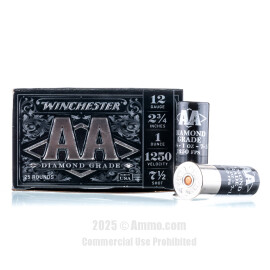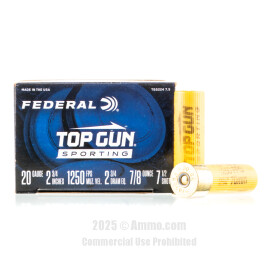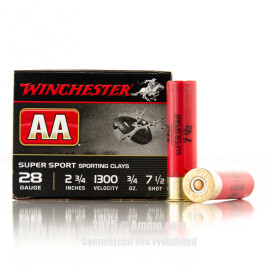Best Shells For Trap Shooting from a Seasoned Shotgunner's Viewpoint
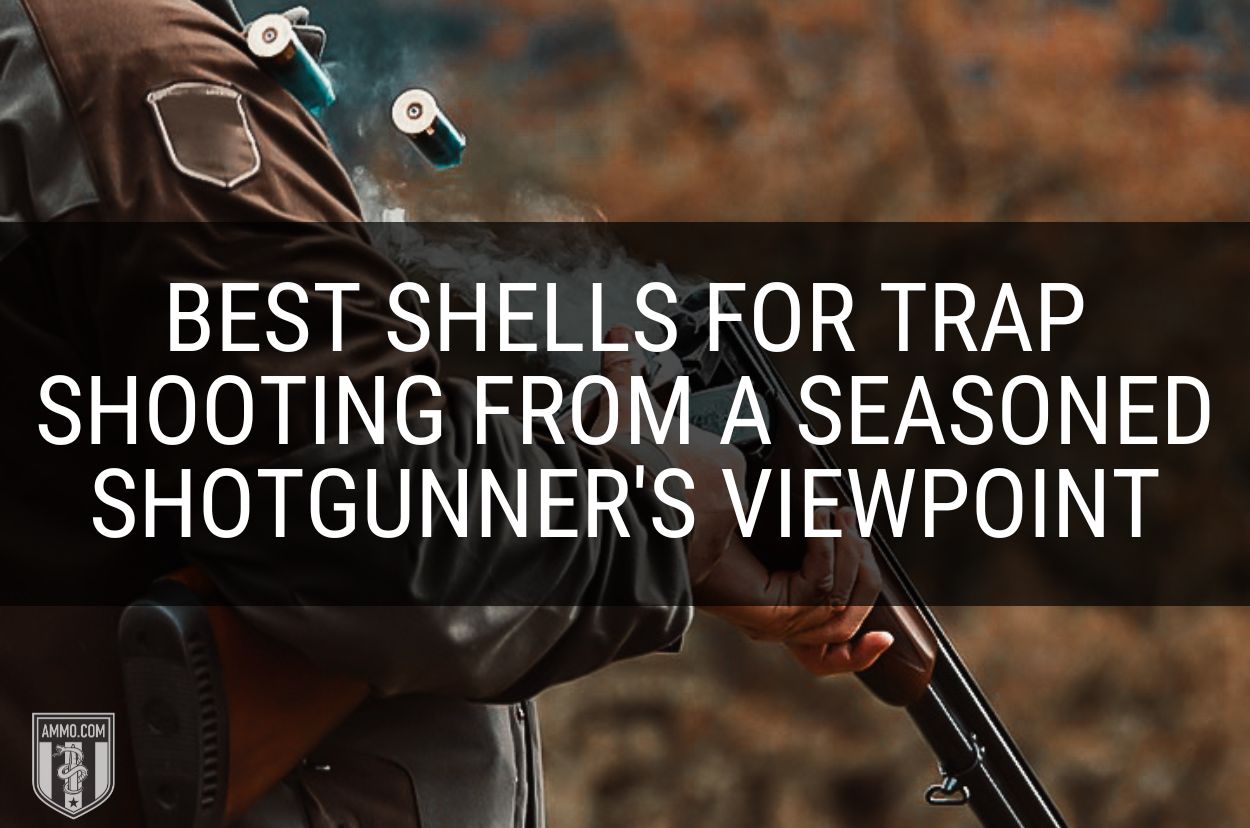
Trap shooting requires specific shot shells according to the National Sporting Clays Association rule book. Still, loads of shells fit these criteria.
So, what are the best shells for trap shooting?
In my opinion, it doesn't get any better than Winchester AA Diamond Grade 12 Gauge 1 oz—#7.5 Shot (Copper Plated Lead).
However, I understand not all shotguns like Winchester ammunition, and not all competitors shoot 12-gauge shotguns. That's why I've compiled a list of other brands and gauges worth testing as you continue reading.
Recommended Ammo For Trap Shooting
- Winchester AA Diamond Grade 12 Gauge 1 oz. #7.5 Shot (Copper Plated Lead) - Best 12ga Shells
- Federal Top Gun Sporting 20 Gauge 7/8 oz. #7-1/2 Shot - Best 20ga Shells
- Winchester AA 28 Gauge 3/4 oz. #7-1/2 Shot - Best 28ga Shells
Winchester AA Diamond Grade 1 oz. #7.5 - Best 12ga Shotshells Overall
Specs
- Shot Size: #7½ Shot
- Shot Weight: 1 oz
- Muzzle Velocity: 1,250 fps
Pros
- Trusted brand
- Meets NSCA standards
- High-quality powder, primers, and projectiles
- It can also be used for hunting quail, pheasants, and rabbits
Cons
- Not as cheap as regular lead shot
- Poor choice for home defense compared to Buckshot
Why We Chose It
Whether you plan on representing Team USA at the Olympics in shooting sports or you're having a friendly competition at your local gun club, Winchester Ammunition is always going to rank near the top of the best shotgun shells.
Winchester AA Diamond Grade 12 Gauge 1 oz. #7.5 Shot (Copper Plated Lead) is no different.
Shooters have trusted Winchester for generations, myself included. I can't remember when I didn't have at least one box of Winchester shotshells in my safe.
So it's not a surprise that I would choose Winchester AA Diamond Grade as the best 12ga shell for shooting trap; whether you're shooting a Beretta, semi-auto, or a Remington over-under, these shells will perform flawlessly.
If you plan to shoot competitions, these shells are perfect because they meet all the criteria of the NSCA, and the larger shot size allows you to shoot longer distances than smaller shot sizes like #8 or #9.
Rarely have I ever had a problem with Winchester shells malfunctioning. This is due to Winchester using high-quality components and having strict quality control measures in place. So you can trust that when you pull the trigger, the shells go boom.
These rounds also double as solid hunting rounds, so you can use the same shells to hunt as you do for competitions, allowing you to get ultra comfortable with them.
However, because these are the best shells for trap shooting, they're more expensive than other target loads. If you need a less expensive option, Fiocchi Shooting Dynamics Target Loads 1 oz. #7-1/2 Shot (Lead) offers clay shooters a similar performance at a little over half the price.
Also, if you're like me and use a shotgun for home defense, you'll need to pick up some buckshot or another larger-size shot because these projectiles won't penetrate thick clothing like slugs or Buckshot.
Overall, I recommend testing Winchester AA Diamond Grade the next time you shoot clay targets because Winchester has yet to fail me while hunting or target shooting.
Federal Top Gun Sporting 20ga 7/8 oz. #7.5 Shot - Best 20ga Shotshells Overall for Trap and Skeet
Specs
- Shot Size: #7 1/2
- Shot Weight: 7/8 oz
- Muzzle Velocity: 1,250 fps
Pros
- Trusted Brand
- Solid ballistics
- Designed for clay shooting and meets NSCA guidelines
- Good price
Cons
- You must buy in bulk to get the best price.
Why We Chose It
Federal Ammunition is a trusted American ammo brand that produces high-quality rounds for competitive shooters and hunters.
Whether you're looking to bust a clay pigeon with birdshot or drop a stud pheasant, Federal Top Gun Sporting 20ga 7/8 oz, #7.5 Shot is an excellent option.
I used Federal target loads throughout my high school and college years when target shooting because they weren't wildly overpriced, and I could count on them to fire when I pulled the trigger.
Even though you can hunt with these rounds, they've been designed with the clay shooter in mind. This means you'll have less felt recoil and maintain good shooting ballistics at longer distances and close ranges. The excellent ballistics are partly thanks to the 2 3/4 oz Dram Equivalent, the amount of powder in the shells.
Federal Top Gun Sporting Shotshells also meet NSCA ammunition guidelines and ATA rules, so you don't have to worry about using ammo against the rules in an NSCA-sanctioned competition.
I honestly struggled to come up with anything negative about these Federal rounds; however, the biggest drawback is purchasing them in bulk to get the lowest price. But if you plan to shoot competitions, then you should be buying bulk ammo anyway, so it's not much of a downside.
Considering all the factors, Federal Top Gun Sporting is the top choice for competitive clay shooters who love their 20-gauge shotgun.
Don't worry if your shotgun doesn't like Federal shotshells; the Winchester Super-Target 7/8 oz #8 shot is another excellent shell to test. It has slightly smaller projectiles with similar felt recoil and ballistics.
Winchester AA 28 Gauge 3/4 oz. #7-1/2 Shot - Best 28ga Shotshells Overall for Sporting Clays
Specs
- Shot Size: #7.5
- Shot Weight: 3/4 oz
- Muzzle Velocity: 1,300 fps
Pros
- Well-known ammo brand
- Reasonably priced (for 28ga shotshells)
- Solid ballistics
Cons
- Expensive compared to other gauges by Winchester
Why We Chose It
It's no surprise Winchester AA 28 Gauge 3/4 oz. #7-1/2 Shot tops the list for the best shells for trap shooting with a 28ga for all the reasons we've discussed above.
Winchester is one of the leading ammunition manufacturers in the world because they use high-quality materials in their ammo. Passing along rounds that clay shooters can depend on when the stakes are high.
Winchester AA 28 Gauge 3/4 oz. #7-1/2 Shot is plenty fast to catch any clay pigeon, whether it's a crossing shot or flying away from you. Plus, you don't have to worry about excessive recoil like steel shot used for duck hunting.
While the price is high compared to Winchester products in other gauges, that's to be expected as fewer shooters choose to use a 28ga. So, to make it worth producing and because there are fewer 28ga ammo manufacturers, they increase the prices.
Overall, you can't go wrong with Winchester AA for trap shooting; after all, it was designed to bust clay pigeons.
How to Choose Ammo For Trap Shooting
Whether it's your first shot or best shot, choosing the perfect ammo for trap shooting will make your experience even more enjoyable.
But how do we pick the right ammo, especially when buying online from Ammo.com?
Because every gun and situation differs, I recommend buying several brands, lengths, charges, and shot sizes to see which combination works best.
First, we have to begin with choosing the correct gauge.
Gauge
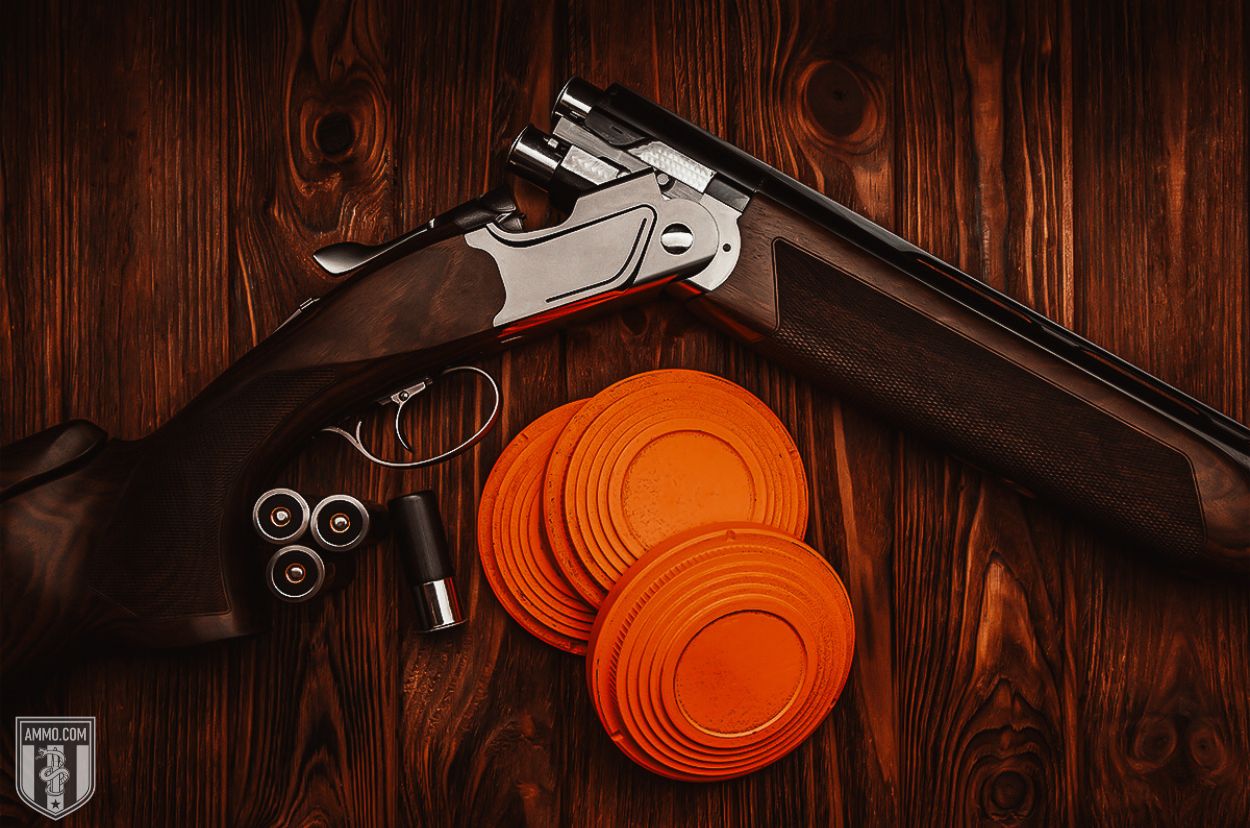
It all starts with buying the correct gauge for your shotgun. NEVER. And I repeat, NEVER shoot a different gauge shotshell through your shotgun.
If you have a 12ga shotgun, only use 12ga shotguns, and the same goes for all the other shotgun gauges.
Suppose you're still searching for the perfect shotgun; here are a few tips to help you choose the best gauge for you.
12-gauge loads tend to have more recoil than 20 and 28-gauge loads. So, if you're recoil-sensitive, I recommend starting with a 20-gauge for competitions. My first Shot with a shotgun was with a .410, and then I graduated to a 20-gauge and finally a 12-gauge when I could handle the recoil.
The problem with the smaller gauges (Yes, I know it's a bigger number. Shotgun gauges are backward) is that they don't have as many pellets in the shell, forcing the shooter to be more accurate. This can be frustrating for new shooters, but in the end, it makes you a much better shot.
Shell Length
Various shotguns are chambered for differing shell lengths. The most common is 2 3/4" for most gauges. However, 3 and 3 1/2" shells exist for some gauges.
To meet ATA and NSCA ammo requirements, you'll probably need to stick with a 2 3/4" shell.
The length of the shell determines the amount of shot or pellets that can fit into the shell. Obviously, if you shoot a larger shot size, you'll have fewer pellets in a shell of the same length.
Gun Powder
Not only does the amount of gunpowder matter, but the quality also matters.
The more gunpowder you cram into a shell, the more it will recoil, but the faster the pellets fly. There's always a limit, so if you're reloading, do not load more than the recommended amount of powder. You risk your safety and the safety of those around you by shooting unsafe ammo.
When you find the shotshell loaded with the perfect amount of powder, hopefully, the quality is good. Otherwise, you'll have instances where your firing pin strikes the primer, and nothing happens. This could ruin your shoot and is another safety hazard.
This is why using shotshells with high-quality materials is so crucial for shooting sports enthusiasts.
Size of Shot
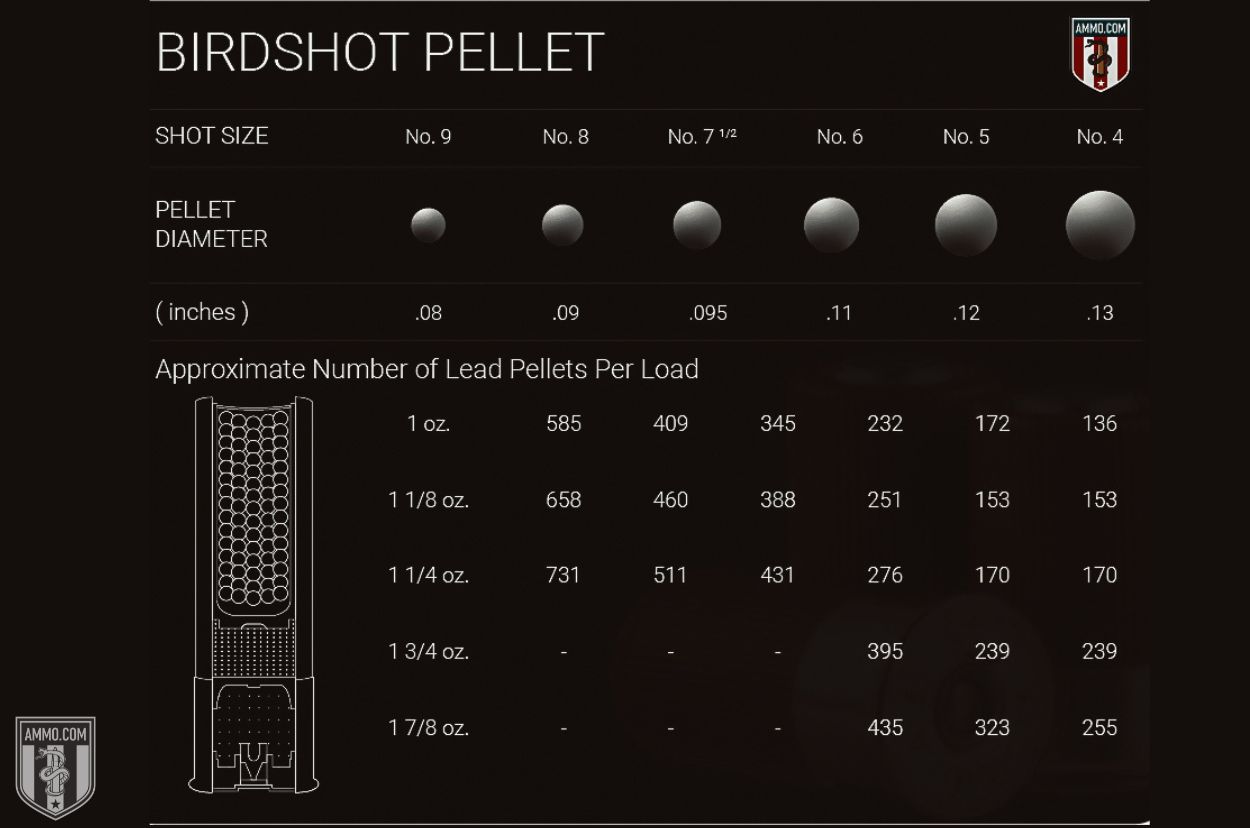
According to the NSCA and ATA rules, you can use a few different shot sizes. Generally, larger shot sizes are best for longer shots because they have more mass and buck the wind more effeciently. On the other hand, smaller shot sizes are best for close range shots in calm conditions, or for those who are recoil sensitive.
Smaller shot sizes also tend to have higher velocities with the same amount of powder.
I mentioned earlier that shot sizes confuse most beginners. This is because the smaller the number, the larger the Shot. So, a #7 1/2 shot pellet is larger than a #9 shot pellet.
Quality of Lead
Similar to the powder, the quality of the lead pellets will affect the accuracy and velocity of the projectiles.
If the pellets are rough or non-uniform, then the quality of the shotshell drastically suffers. While some rounds might be less expensive, it's probably because they're using lower-quality materials to make their shotshells, which won't perform up to competitive standards.
Putting it All Together
Now that we have a basic understanding of shotshells and the materials, it's time to learn what it all means as a whole and how you should choose the best shot shells for trap shooting.
It's time for the fun part! Now that you've purchased several different brands in various loads and shot sizes, it's time to head to the range and see which one your shotgun shoots the best.
First, I like to test accuracy by shooting a paper target; sometimes, I use a pumpkin or watermelon for dramatic effect, but I need to see which shell puts more pellets on the target.
I note the most accurate shotshell and then move on to how well each one cycles through my gun. If you're shooting an over/under, this doesn't matter.
Finally, it's time to see which one I can hit the most clay pigeons with while trap shooting. The winner is ultimately the one I feel most comfortable shooting. I then stock up on those shotshells at Ammo.com!
Frequently Asked Questions
Below, the team at Ammo.com has gathered some commonly asked questions about the best shells for trap shooting.
What is the best ammunition for trap shooting?
The best ammunition for trap shooting is Winchester AA Diamond Grade 12 Gauge 1 oz—#7.5 Shot (Copper Plated Lead).
What is the difference between trap shooting and skeet shooting?
The difference between trap shooting and skeet shooting is how the targets move. In trap shooting, the targets are generally moving away from the shooter, while in skeet shooting, the clays are sporadic and often cross paths like real birds.
What type of ammunition is used in trap shooting?
A shotgun shell is the type of ammunition used in trap shooting.
Parting Shots: Best Shells for Trap Shooting
Since you've read this article, you know the best shells for trap shooting are Winchester AA Diamond Grade 12 Gauge 1 oz. #7.5 Shot (Copper Plated Lead) because they have excellent velocity, are reliable, and meet competition standards.
If you're convinced by the performance of Winchester AA Diamond Grade 12 Gauge 1 oz. #7.5 Shot for trap shooting, consider purchasing these shells in bulk to maintain a consistent supply for all your competitions. Be sure to visit our bulk 12 gauge ammo page to discover the best bulk deals available.
Cartridge Recommendations
- Best Caliber for Deer Hunting
- Best Big Game Caliber
- The 10 Best Coyote Cartridges
- Best Cartridge for Elk Hunting
- Best Cartridge for Self-Defense
- Best Cartridge for Concealed Carry
- Best Handgun Cartridge
- Best Moose Cartridges
- Best 40 S&W Ammo For Self Defense & Target Practice
- Best 223 Ammo
- Best .44 Magnum Ammo
- Best 270 Ammo for Hunting
- Best 17 HMR Ammo for Varmint Hunting and Plinking
- Best 22 Rimfire Ammo
- 4 Best AK-47 Ammo Picks [7.62x39]
- Best 38 Special Ammo for Self Defense
- Best Handgun Ammo for Self-Defense in Common Calibers
- Best 308 Ammo For Hunting & Target Shooting
- Best 300 Win Mag Ammo
- Best 243 Ammo for Target Shooting
- 10 Best 6.5 mm Cartridges For Long-Range Shooting and Hunting
- Best 45 ACP Hollow Points for Self-Defense
- Best 12 Gauge Ammo for Home Defense
- Best 32 ACP Ammo for Your Pocket Pistol or Backup Gun
- Top 13 Best AR Calibers That Aren’t 5.56 NATO
- Best Ammo for Smith and Wesson M&P 9mm Shield
- Best 7.62x39 Ammo for Self Defense
- Best 20 Gauge Ammo for Home Defense, Whitetail, and Upland Game
- Best Ammo for 1911 45 ACP
- Best 12 Gauge Ammo for Deer Hunting
- Best .40 S&W Ammo for Self Defense
- Best 7.62x39 Hunting Ammo
- Best 5.56 Ammo for Home Defense
- Best 380 Self-Defense Ammo
- Best 45 ACP Ammo for Every Situation
- Best Ammo for Glock 43x
- Top 5 Best 22 WMR Ammo on the Market
- Best Ammo for Glock 19
- Best Sniper Ammo
- Best 38 Special Ammo For Target Practice Precision Shooting
- Top 5 Best 45 ACP Ammo for Target Practice
- Best 6.5 Creedmoor Hunting Ammo
- Top 10 Best Sniper Rifle Cartridges
- Best 6.5 Grendel Ammo
- Best 5.45x39 Ammo for Your Gun
- Best 10mm Ammo for Bear Defense
- Best 350 Legend Ammo
- Top 5 Best 30-06 Ammo for Deer Hunting
- Best 30-06 Ammo for Accuracy
- Best 300 Win Mag Ammo for Deer
- Best M193 Ammo for Stockpiling
- Best 300 Blackout Ammo for a 7.5" Barrel
- Best Shotgun Shells for Target Practice
- Best 45 ACP for Bear Defense
- Best 223 for Deer Hunting
- Best Exotic 9mm Ammo
- Best Duck Hunting Shells
- Best .357 SIG Defensive Ammo
- Best Beretta APX 9mm Ammo
- Best 22 Pistol Ammo
- Best 9mm Ammo
- Best 308 Ammo for Deer Hunting
- Best Ammo for the Taurus GX4
- Best Ammo For Taurus PT111 G2
- Best Shells For Trap Shooting
- Best 38 Special Ammo for Snubbies
- Best 410 Ammo For A Taurus Judge
- Best Ammo for Ruger Security 9
- Best Ammo for Taurus G3c
- Best 7mm Rem Mag Ammo
- Best Lead-Free Hunting Ammunition
- Best 300 Blackout Ammo for Hog Hunting
- Best 9mm Home Defense Ammo
- Best 10mm Ammo for Every Shooting Situation
- Best .22 LR Ammo for Self-Defense
- Best Long-Range Hunting Bullets
- Best 357 Magnum Ammo For Every Shooting Situation
- Best 45 ACP Ammo For Self-Defense
- Best 6.5 Creedmoor Ammo For Accuracy
- Best 45-70 Ammo For Hunting & Target Shooting
- Best Turkey Loads
- Deadliest Shotgun Ammo For Home Defense
- Best 300 Win Mag Ammo For Elk Hunting
- Best 9mm Subsonic Ammo
- Best 7mm PRC Ammo
- Best 300 Blackout Subsonic Ammo
- Best 308 Subsonic Ammo for Hunting
